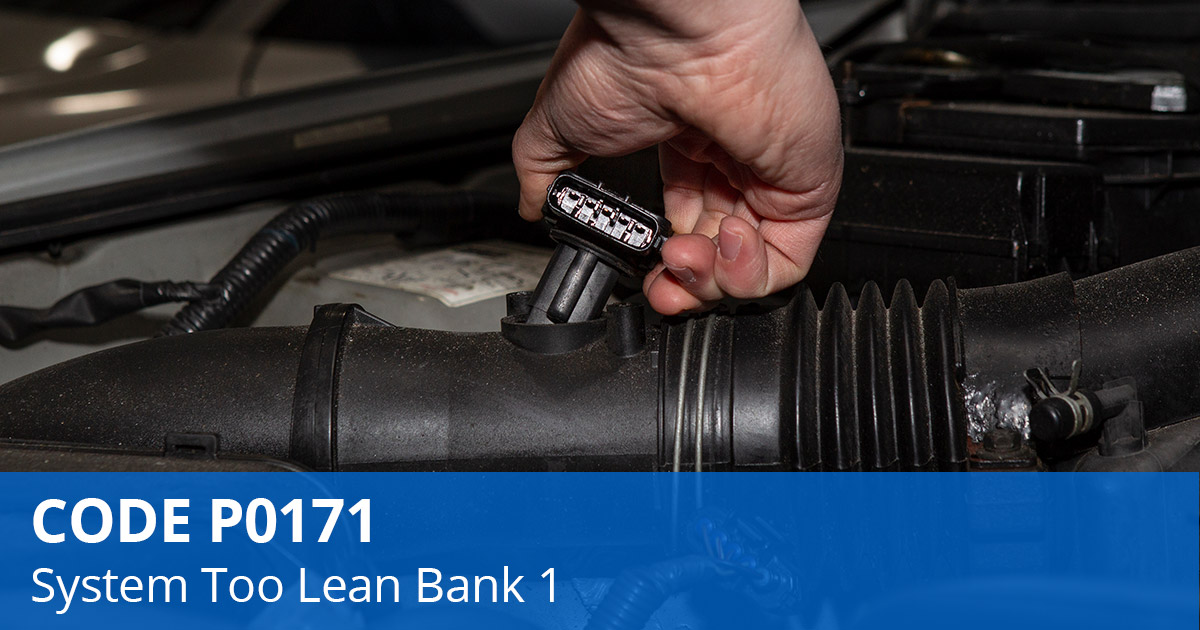Decoding the Mystery: Toyota Engine Code P0171
Ever had that sinking feeling when your check engine light illuminates? It's like a cryptic message from your car, and deciphering it can feel like a daunting task. One common code that can trigger this warning in Toyota vehicles is the P0171 code, often referred to as a "lean condition." What does this mean, and what can you do about it? Let's dive into the world of the Toyota P0171 engine code and unravel its mysteries.
Imagine your engine as a gourmet chef, meticulously combining the perfect blend of ingredients – fuel and air – to create power. A P0171 code signifies that this delicate balance is off. Specifically, it indicates that the air-fuel mixture is too lean, meaning there's too much air compared to the amount of fuel. This imbalance can lead to a range of performance issues and potentially damage your engine over time.
The P0171 diagnostic trouble code (DTC) is a standardized code used across various car manufacturers, including Toyota. It's a signal from your car's computer, the Engine Control Module (ECM), indicating that the oxygen sensors detect a lean condition in the engine's Bank 1. Bank 1 typically refers to the side of the engine containing cylinder number one.
While the P0171 code itself doesn't pinpoint the exact cause, it provides a valuable starting point for diagnosis. Several factors can contribute to a lean condition, including vacuum leaks, faulty oxygen sensors, malfunctioning mass airflow sensors (MAF), or issues with fuel injectors or fuel pumps. Pinpointing the root cause is crucial for effective repair and to prevent the code from recurring.
Understanding the implications of this engine code is essential for any Toyota owner. Ignoring the P0171 code can lead to decreased fuel efficiency, reduced engine power, rough idling, and even engine damage in severe cases. Addressing the issue promptly can save you money on repairs and ensure the longevity of your vehicle's engine.
Several potential culprits can trigger a P0171 code. These include vacuum leaks in the intake manifold or hoses, a faulty MAF sensor providing incorrect air readings, failing oxygen sensors misinterpreting the air-fuel mixture, clogged or dirty fuel injectors restricting fuel flow, or a failing fuel pump unable to supply adequate fuel pressure.
Addressing a P0171 code involves a systematic diagnostic approach. Start by visually inspecting for vacuum leaks, checking the condition of air filters and intake hoses. If no obvious issues are found, using a diagnostic scanner can provide more detailed information about sensor readings and potential faults. Testing fuel pressure and inspecting fuel injectors may also be necessary.
While technically a "benefit" isn't associated with having a P0171 code, recognizing and addressing it offers several advantages. First, fixing the underlying problem improves fuel efficiency. Second, it restores optimal engine performance and drivability. Third, it prevents potential long-term engine damage, saving you from costly repairs down the line.
Frequently Asked Questions:
1. Can I drive with a P0171 code? While you might be able to drive short distances, it's not recommended. Prolonged driving with a lean condition can damage your engine.
2. How much does it cost to fix a P0171 code? The cost varies depending on the underlying cause. It could range from a simple air filter replacement to more complex repairs like replacing a fuel pump.
3. Can a dirty air filter cause a P0171 code? Yes, a restricted airflow due to a dirty air filter can contribute to a lean condition.
4. How can I prevent a P0171 code? Regular maintenance, including air filter replacements, fuel system cleaning, and checking for vacuum leaks, can help prevent this code.
5. Is P0171 the same as P0174? Both codes indicate a lean condition, but P0174 refers to Bank 2 of the engine.
6. Can a faulty gas cap cause a P0171 code? While less common, a loose or faulty gas cap can introduce excess air into the fuel system, contributing to a lean condition.
7. Can I fix a P0171 code myself? Depending on your mechanical skills and the cause, some repairs can be done at home. However, more complex issues may require professional assistance.
8. What tools do I need to diagnose a P0171 code? A diagnostic scanner is a valuable tool for reading codes and monitoring sensor data. Basic hand tools are also necessary for inspections and repairs.
Tips and tricks for dealing with a Toyota P0171 engine code include checking for loose or disconnected vacuum hoses, cleaning the MAF sensor with MAF cleaner, and inspecting the air intake system for cracks or damage. Regularly replacing the air filter and using quality fuel can also help prevent lean conditions.
In conclusion, the Toyota engine code P0171, indicating a lean air-fuel mixture, might seem intimidating, but understanding its causes and implications empowers you to address the issue effectively. From vacuum leaks and faulty sensors to fuel delivery problems, various factors can contribute to this imbalance. By taking a proactive approach to diagnosis and repair, you can restore your engine's performance, improve fuel efficiency, and prevent potential long-term damage. Don't ignore that check engine light – take action, and keep your Toyota running smoothly for years to come. Regular maintenance and timely repairs are key to preventing the P0171 code and ensuring a healthy, efficient engine. Remember, a well-maintained car is a happy car!
Navigating employer changes understanding permohonan pertukaran majikan pekerja asing
Discover st johns culinary gems a foodies guide
St louis park mn injury attorneys you need to know












